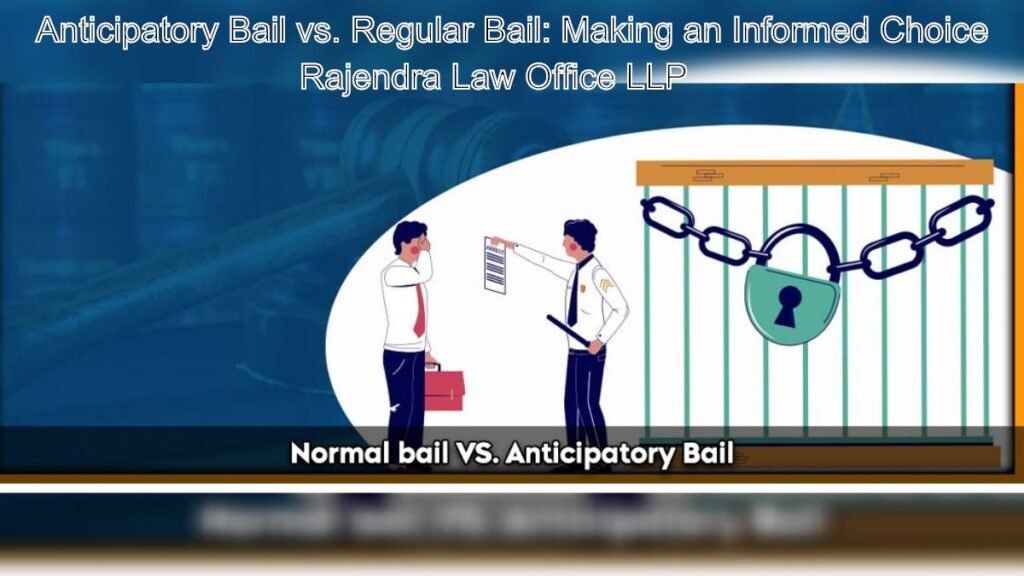Anticipatory Bail vs. Regular Bail: The prospect of an arrest can be incredibly stressful. While the legal system upholds the presumption of innocence, the experience of being detained can be disruptive and emotionally draining. Fortunately, Indian law offers mechanisms to potentially mitigate this stress – anticipatory bail and regular bail. This article, brought to you by Rajendra Law Office LLP, aims to demystify these concepts and empower you to make an informed choice when facing potential legal trouble.
Navigating Uncertainty: Anticipatory Bail vs. Regular Bail – Making an Informed Choice with Rajendra Law Office LLP
Understanding Bail: A Stepping Stone to Freedom
Bail, in essence, is a monetary security deposited with the court to secure the release of an accused person from custody. It serves as a guarantee that the accused will appear for future court hearings. If the accused does appear, the bail amount is typically refunded after the case is concluded.
Regular Bail: Seeking Release After Arrest
Regular bail is the more commonly known option. It comes into play after an arrest has already occurred. The arrested individual, or their legal representative, can apply to the court for bail. The court will consider various factors before granting bail, including:
- Severity of the Offense: More serious offenses typically have stricter bail conditions or may not be bailable at all.
- Flight Risk: The likelihood of the accused absconding and not appearing for future court dates.
- Tampering with Evidence: The possibility of the accused influencing or destroying evidence.
- Criminal History: Past criminal offenses can influence the court’s decision regarding bail.
Anticipatory Bail: Proactive Protection for Potential Arrests
Anticipatory bail, on the other hand, is a proactive measure. It allows an individual to approach the court and seek bail before an arrest takes place. This option is particularly valuable when there’s a genuine apprehension of arrest for a non-bailable offense. Here’s how it works:
- Application: The individual, through a lawyer, files an anticipatory bail application before the High Court or the Court of Session.
- Highlight the court’s role: When considering your anticipatory bail application, the court will assess two key factors: your genuine fear of arrest and the persuasiveness of your arguments for bail.
- Court Decision: The court will carefully consider the application and decide whether to grant anticipatory bail.
Choosing the Right Path: Anticipatory Bail vs. Regular Bail
The choice between anticipatory bail and regular bail depends on the specific circumstances of your case. Here’s a breakdown to guide you:
- When to Consider Anticipatory Bail:
- You have a legitimate reason to believe you might be arrested for a non-bailable offense.
- You want to avoid the disruption and stress of being in custody before your case is heard.
- When Regular Bail Might Be More Suitable:
- You have already been arrested.
- You may not have anticipated the arrest or had the opportunity to seek anticipatory bail beforehand.
Benefits of Seeking Legal Counsel
Regardless of whether you’re considering anticipatory bail or regular bail, seeking legal counsel from a qualified lawyer is crucial. An experienced attorney at Rajendra Law Office LLP can offer significant benefits:
- Expert Guidance: They can analyze your situation and advise you on the most appropriate course of action.
- Strong Application Preparation: They can assist in crafting a compelling application for anticipatory bail, outlining the legal basis for your request.
- Effective Representation in Court: They can represent you in court hearings, presenting arguments and advocating for your release on bail.
FAQs: Anticipatory Bail vs. Regular Bail
A: Yes, that’s the core purpose of anticipatory bail. Focus on Opportunity: In the face of a potential arrest for a serious, non-bailable crime, you have the opportunity to apply for anticipatory bail.
A: No, the court has the discretion to grant or deny anticipatory bail based on the merits of your application.
A: Violating bail conditions can lead to the forfeiture of your bail amount and potentially even your arrest.
Conclusion
Facing potential arrest can be a daunting experience. However, understanding the options available, like anticipatory bail and regular bail, can empower you to take proactive steps towards protecting your freedom. Rajendra Law Office LLP stands ready to assist you in navigating the legal complexities and advocating for your rights. Contact us today for a consultation and let us help you make an informed decision.
Read More
- Understanding Bail & AB Matters: What You Need to Know
- Anticipatory Bail in India: Overview and Procedure
- Expert Bail Lawyers in Chennai – Fighting for Your Rights
- Top Criminal Defense Lawyers: The Best Legal Services in India
- National Legal Services Authority of India (NALSA)
- Affordable Lawyers in Chennai: Quality Legal Services at Your Reach
- Facing Arrest? Get the Right Bail – Anticipatory vs. Regular
- Applying for Anticipatory Bail? Precautions You Must Take

